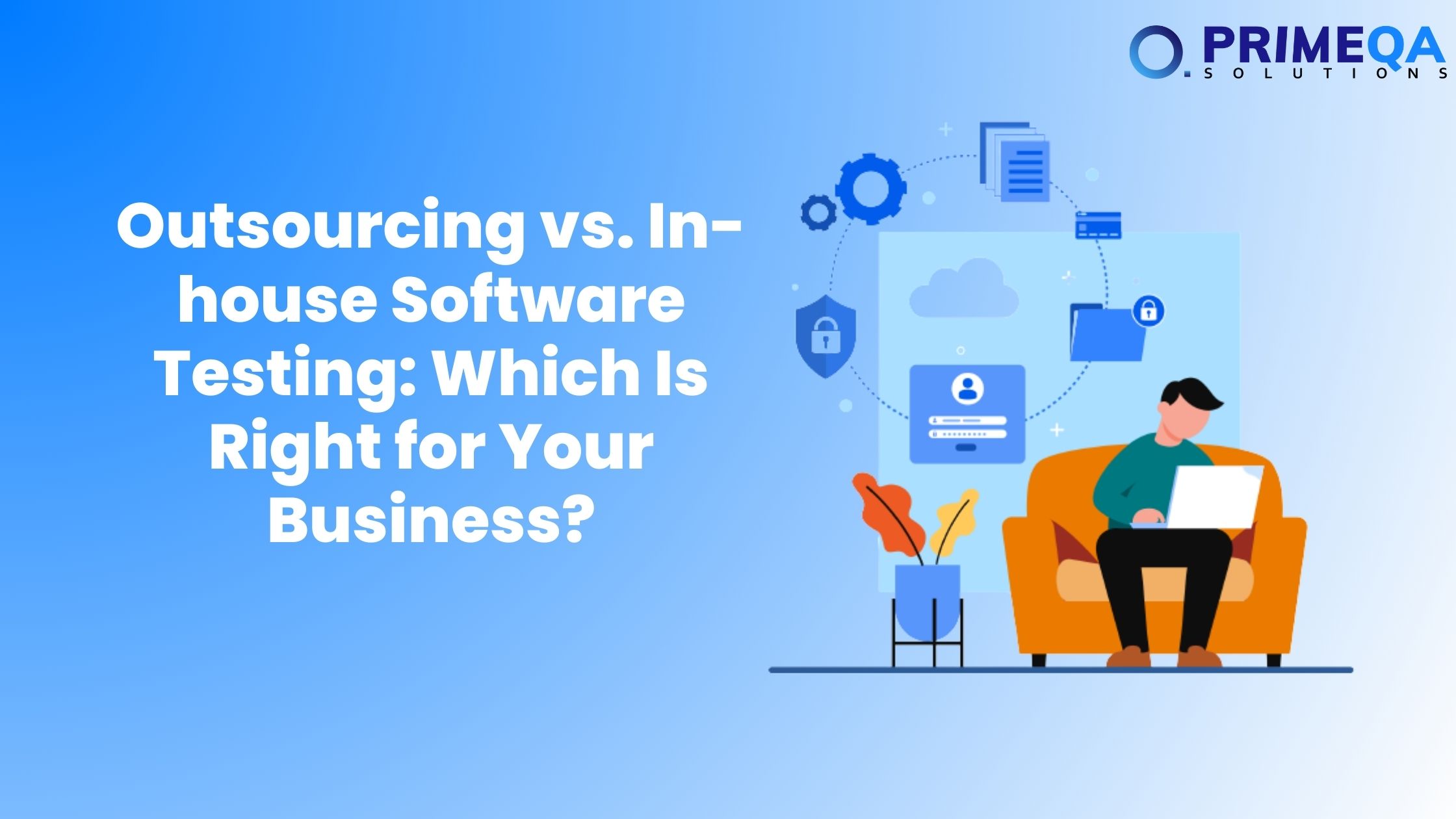Major Differences between Outsourcing and In-house Software Testing:
In this modern era of the digital age software testing has dramatically changed the landscape of the software testing sector, with the drastic growth of machine learning, data science, and artificial intelligence. Businesses are engaging with the latest testing methods like continuous testing, shift left, security testing, and more. This is why the world aspiring for applied AI reports a CAGR of more than 8%. Businesses all around the world have adopted software testing services to enhance the efficiency of their software.
It can be a tough choice for a business owner to decide which type of service suits best for his/her business. The in-house software testing teams help the organization’s culture, business vision, and constraints. On the other hand, outsourcing the entire software testing process to get more professionals would help to cut costs and be more objective about the quality of the software products. In the USD there are fifty billion software testing tools in the market, the question arises: Which is better: Outsourcing or In-house?
 What Does Outsourcing Software Testing Really Mean?
What Does Outsourcing Software Testing Really Mean?
Software testing is outsourcing and can be defined as assigning testing efforts to a third-party company or expert. The practice is often employed in response to demands like automation testing, QA testing, and rapid deployments. It helps businesses to level up their testing capabilities with AI-driven testing in the digital world. Moreover, external teams also bring in seasoned professionals in emerging software testing tools and trends, like cybersecurity-focused testing, and sustainable testing.
Pros of hiring Outsourcing Software Testing
- Cost Saving: Outsourcing software testing services can be more cost-effective for businesses than hiring a full-time in-house team. By outsourcing these services you can avoid paying additional costs like recruiting, training, and retaining the in-house employees.
- Scalability: Outsourcing the software testing services allows you to scale your testing services services according to the project in-house. The testing needs often fluctuate as per the requirements of the industry, thus outsourcing can be beneficial in order to scale the business.
- Improved Efficiency: By hiring an outsourcing team you can easily streamline the testing process and improve the overall efficiency.
- Focus on core business activities: Outsourcing the testing services can be beneficial for the companies, as the focus of the company shifts to the core business activities.
- Access to specialized expertise: When you outsource services from the outsourcing companies. The expert professionals thoroughly test the software.
Cons of hiring Outsourcing Software Testing
- Dependency of third-party– Once you rely on outsourcing services you become dependent on the third party as it affects your ability to make even minor updates.
- Lack of Control– When you outsource testing services you have less control over the software testing processes.
- Quality Concerns– At times outsourcing services can be a concern for businesses as it may hamper the quality of software testing. It can be a big hurdle for companies that have clear quality standards and certain expectations.
- Security Risks– Outsourcing Services can also lead to security risks related to intellectual property and sensitive data.
- Communication Challenges– Outsourcing external teams often leads to communication challenges if there and cultural and language barriers
What does In-house Software Testing mean?
When a business hires an in-house QA team ensure the sound automation testing of their proprietary applications. These internal software testers work closely with the developers, ensuring that every feature meets specific quality standards and requirements before releasing the product to customers. Businesses usually hire expert professionals where the tasks activities and functions that are performed within a company by its employees, rather than being outsourced to an external third party.
Pros of hiring an In-house Software Testing Team
- Eliminates Communication Barriers– There is direct communication between the developers and software testers which makes work faster. Having an in-house team that is familiar with the functionality of the organization results in immediate bug fixes and a better understanding of the project requirements
- No security risks– The risk of data breaches is very low when you keep in-house testing services as the sensitive data remains in the organizations
- Availability of testers – An in-house team responds instantly to urgent tasks without delay which usually occurs in outsourcing. It’s effective for organizations who want to enhance the speed of their software testing services.
- Expertise and knowledge of Business needs– The in-house software testers of the company are familiar with the culture and operational functions of the organization. Familiarity with the organization results in the formulation of tailored strategies according to the business goals.
- Full control over Testing– Having an in-house team allows the business to have complete control over the testing process, procedure, and timeline. It ensures the alignment closely with the business objectives.
Cons of hiring an In-house Software Testing Team
- Scalability Issues– Scaling the team according to the project demand can be a big issue as the organizations may find it difficult to onboard new candidates as per the project requirement
- High costs incurred– Having an In-house team for software testing can be a costly affair due to operational costs, infrastructure, and salaries of each employee. Having an In-House team requires a huge budget which is next to impossible for small business owners.
- Finding Quality Workforce– Finding skilled testers can be a tedious job in the competitive market. Organizations may struggle a lot as in most cases there is a huge skill gap in the testers.
- Resource Intensive– Having an In-house team can be resource-intensive as it saves a lot of time and does not divert the focus from the core business.
- Limited Knowledge and Expertise– At times In-house team may lack the specialized skill or knowledge required for a complex project. This hinders the Pros of hiring Outsourcing Software Testing
Comparison of Outsourcing and In-House Testing:
| Benchmark | Outsourcing Software Testing | In-House Software Testing |
| Communication Barrier | Potential communication issues due to differences in time zones, language barriers, and lack of real-time feedback | Direct, real-time communication between the testing and development teams, improving clarity and speed. |
| Security Issues | Legal documents are needed to safeguard intellectual property. | Easier to maintain control over confidential property and proprietary information. |
| Cost Incurred | The costs vary on the scope of work and project duration. | Costs are fixed in this case, regardless of workload, leading to underutilized resources during low-demand periods. |
| Scalability Issues | Easily scalable to meet fluctuating project needs, both in terms of tools and technologies for software testing | It is difficult and costly to scale quickly; hiring new software testers or upgrading these tools takes time and money. |
| Flexibility | It requires adjustments to processes and tools based on vendor capabilities | Complete control over adapting software testing tools and processes to meet the evolving needs of the project. |
| Quality Control | Quality may vary based on the expertise of the vendor | Higher control over testing quality allows for direct oversight and customization. |
| Time-to-Market | Business owners have usually defined procedures, software products are tested and released more quickly. | Timelines can be longer due to internal issues, resource bottlenecks, or with limited expertise. |
Factors to Decide Which Model Is Right for Your Business
- Control over Software testing: In-house testing offers complete control over the software testing processes, methodologies, and quality standards, which is vital for businesses that prioritize internal oversight.
- The size of the Project and its duration: Outsourcing works well for complex projects with fluctuating demands or short-term needs, where flexibility and scalability are important
- Security Issues& compliance: In-house testing is often preferred if the businesses handle sensitive data, or intellectual property, or must comply with strict regulatory requirements.
- Scalability needs of the business: Outsourcing provides easy scalability, making it suitable for testing needs that are unpredictable or project-based.
- Communication & collaboration: Outsourcing may introduce communication challenges, especially with time zone differences or language barriers, unless strong coordination processes are established.
- Control over Software testing: In-house testing offers complete control over the software testing processes, methodologies, and quality standards, which is vital for businesses that prioritize internal oversight.
Conclusion
When you outsource in-house software testing companies to have their respective benefits, the right choice hinges on factors that align more with the business needs. Based on the needs of your company, you can even go ahead with a mix of the two. The only criteria that remain undeniable are the quality of the software product and the experience that it offers to the customers.
FAQ
Which is better, in-house or outsourcing software testing?
Outsourcing and in-house teams both have their pros and cons. The choice of testing depends totally on factors like Project size and duration, Control over testing processes, Security & compliance, and scalability needs of the business.
What are the main advantages of outsourcing software testing?
Benefits of outsourcing include lower labor costs, less strict regulations, flexibility, reduced overhead, and the ability for the home office to focus on what it does best while letting others do the more low-level work. Ideally, outsourcing helps businesses to cut costs and lower expenses, thus increasing productivity, and greater profits.
What are the advantages of In-house software testing?
In-house testing gives complete control over the testing process. It enables better communication between the team’s data security and agility in addressing changes in SDLC
How does scalability differ in in-house and outsourcing testing?
Outsourcing allows for easy scalability to meet fluctuating demands, while in-house teams may struggle with rapid scaling, requiring time and investment for hiring and tool upgrades.







